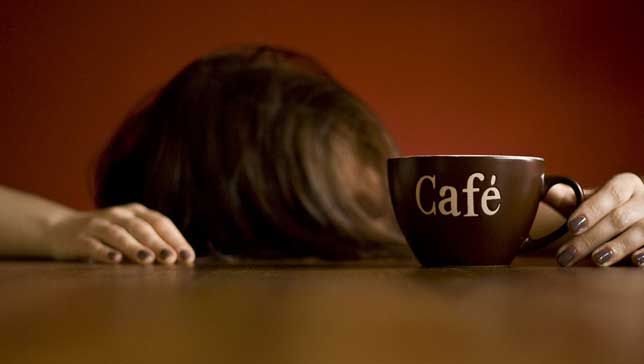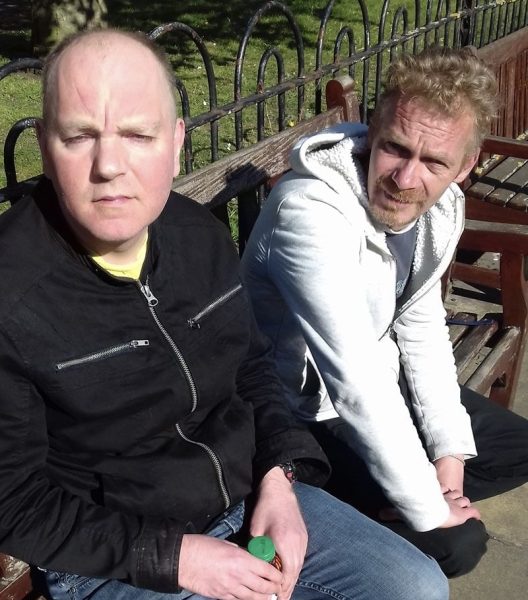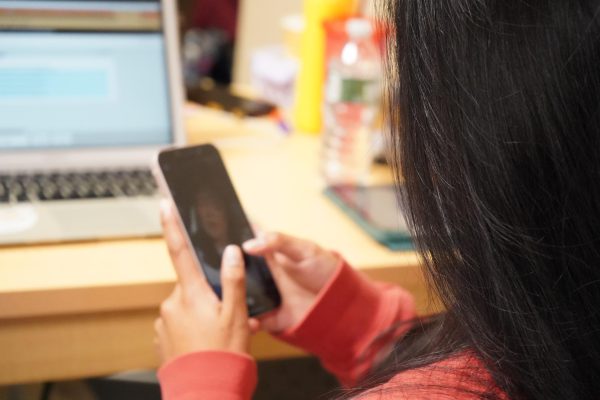Sleep Deprivation and Caffeine, Every College Students Enemy
Being a college student allows one to do two out of these three things: study, have a social life, or go to sleep.
Sometimes, sleep is never the answer for most college students.
According to an online survey, sleep is being thrown into a corner. The lack of sleep amongst college students is 70 percent. That means 70 percent of college students are not taking in their required eight hours of sleep per night.
What exactly is sleep? Sleep is a resting state, in which an individual becomes relatively unaware of the environment. During sleep, the period of rest and relaxation, most physiological functions such as body temperature, blood pressure, and rate of breathing and heart beat decrease. However, sleep is also a time of repair and growth, especially for some tissues.
The lack of sleep can come from having too much stress from school, sports, jobs, internships, or anything else that comes to mind. The most common reason why sleep is sacrificed is because there is homework that needs to get done.
Take the writers for example, of this Impact Now. Both of us [Kayla and Weronika] have lack of sleep and are mostly addicted to coffee and caffeinated drinks and food. But Kayla is more addicted to coffee and has around three cups a day.
I [Weronika] usually stay up late to finish homework or study for an exam for the next day. I don’t have the best of time management skills. Work, plus driving to school and schoolwork usually leaves me with a good four hours of sleep every night. Well maybe not every night. At least once a week a pull an all nighter just to get stuff done.
In order to pull that all nighter, I spend time with one of my best friends. Coffee. I don’t drink too much of it, but two jumbo solid strong cups of coffee will usually do the trick. When I do get some sleep, I usually have one cup of coffee earlier in the day to keep me up. Or anything caffeinated really.
I usually spend all my time finishing up assignments and then starting the process over again. All of my friends always ask when I am free so they can catch up and go to dinner or go out for drinks, or something to that extent. Usually I just push it back as far as I possibly can. I usually meet up with everyone at the end of the semester, once everything is over and done with.
Yes, lack of sleep isn’t the best thing in the world, but it is how many college students get things done.
Having a job while being in college as well isn’t always the easiest. One has to balance their job as well as schoolwork and if you’re an athlete, all your sports.
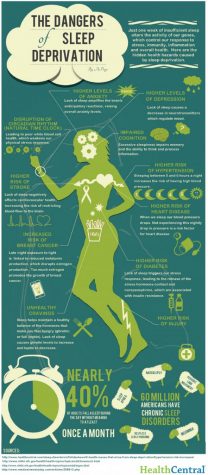
College students, as well as most adults require six to ten hours of sleep per night. With all the overload of activities and schoolwork that number most likely drops down to about four to six hours of sleep.
To get their school work done, college students believe they must stay up and finish the assignment or else it won’t get done. 35% of college students say that they stay up until at least 3 a.m. a minimum of one night every single week.
Many sleepless nights can cause mood swing changes, as well as health risks in the average college student. Sleep deprivation can cause higher blood pressure, as well as poor eating habits. These poor eating habits can include eating more sugar filled items like candy rather than eating healthy and grabbing a bowl of fruits.
Susan Rivera, a junior psychology major jokes as she says she’s forever sleep deprived.
“I’m always up at night doing my work for all my classes, that I end up losing track of time,” Rivera said. “But losing sleep is not good at the same time, it messes with your mental illness, as well.”
“You can develop health conditions like high blood pressure, stress, heart problems, obesity, stress, depression, and even anxiety,” Rivera said.
“Caffeine has the same health conditions,” she adds.
According to a survey released online 68% of college students say that they have trouble being able to fall asleep at night because they’re stressed out because of their academics or something that is affecting them emotionally.
“I tend to not be able to sleep at night because I’m always stressing out for school. By the time I go to bed it’s around one or two in the morning,” says sophomore, pre med student, Ivona Vasquez.
Stress on even the most efficient student that hands in all their assignments on time can cause them to have sleepless nights, which in return results in having them do poorly in one or more classes. According to an online survey, 23.2% of people who don’t get enough sleep every night report that they have trouble being able to concentrate on things, which is why some students are not able to stay focused in class during the day.
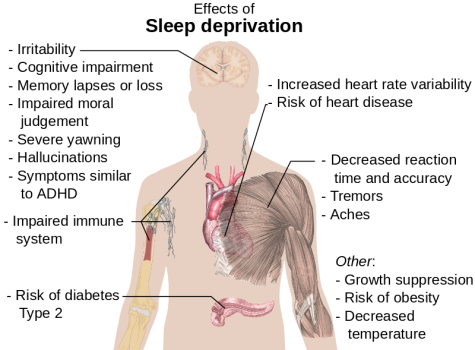 Lack of sleep quality is leading to unproductive outcomes, especially in the classroom. An online study revealed that sleep deprived college students became increasingly likely to miss class; 12 percent of poor sleepers miss or fall asleep in class three or more times a month.
Lack of sleep quality is leading to unproductive outcomes, especially in the classroom. An online study revealed that sleep deprived college students became increasingly likely to miss class; 12 percent of poor sleepers miss or fall asleep in class three or more times a month.
One of the few reasons college students have sleepless nights are because of staying up late doing their assignments. According to a study done at the John Hopkins Sleep Disorders Center, the bright light of a computer screen can alter the body’s biological clock and suppress the natural production of melatonin, a hormone in the body that regulates sleeping and waking hours.
Stress related factors additionally play a large role in college student sleep deprivation. The study, conducted on 1,125 students, at the University of St. Thomas in Minn., found that 68 percent have trouble falling asleep due to academic and emotional stress, resulting in later bedtimes. These statistics reveal that stress has a much more significant impact on sleep quality than other factors, such as alcohol consumption or late night electronic usage.
***
During a normal week of college classes, 20 percent of students will pull at least one all-nighter every month. As a helper through the all nighter, college students drink coffee or caffeinated drinks to help stay awake.
Sitting in class, one may look around see energy drinks, coffee, tea, and soda in fellow classmates hands. College students in today’s society have become more dependent on caffeine in order to perform at their best in multiple events of their hectic lives.
Many of the drinks students consume are not only coffee, but also Red Bull, Mountain Dew, Diet Coke, brewed tea, and other soft drinks. Students also consume a lot of junk food, in particular chocolate, which also carries high amounts of caffeine.
Between exams, homework, and socializing, there’s been an increasing demand for caffeinated products, especially as it’s getting closer to finals week.
Starting college, I was never a coffee drinker. It actually wasn’t until my sophomore year when I took on six courses, five days a week. On top of this, I had an 8:30 a.m. class, which is every student’s worst nightmare, let alone, it was on Fridays. Once my legal studies professor let us out around 11:30 a.m., I’d walk up to Victory Hall and buy myself coffee. That’s when I started drinking coffee religiously as if it were bottles of water.
Once it became the middle of the fall semester, the one girl who worked at the Einstein’s pretty much knew my order like it was the back of her hand. Then, once the new residence hall opened, and I moved in, so did the Starbucks. This meant coffee was in my reach even closer, and it became a Wednesday and Thursday ritual for me.
Everyone knows I love my coffee, but once Spring Break came, I went a whole week without it. Once I got back to school, and my film and culture class began stressing me out, to the point I wanted to cry, I went right back to drinking coffee. As weird as it may seem, I only get coffee when I’m stressing, tired, and get frustrated.
Caffeine is a stimulant drug, where it speeds of the messages travelling between the brain and the body. It’s often found in camelia sinesis, paulinia cupana, theobroma acaeao, coffea arabica, and cola acuminate, which are all found in teas, energy bars and drinks, chocolate, coffee, and soft drinks.
Students believe caffeine increases energy, alertness, attentiveness and sociability for it’s users, as they may be right, but don’t know of the exact long term effects the drug has on the human body.
After the consumption of any type of caffeine, it’s known that there is no safe level of drug use. The use of any drug creates a risk, whether it’s short term or long term.
Caffeine stimulates the central nervous system, and ergogenic, meaning that it improves physical performance, which is why some athletes drink energy drinks and coffee prior to a big game.
Aside from that, many studies have shown that people who consume caffeine have higher rates of kidney and bladder cancer, fibrocystic breast disease, pancreatic cancer, and osteoporosis. Caffeinated drinks also increase urine output and boosts blood pressure, but this effect is only temporary. Caffeine has been linked to calcium loss, but the effect is very small and only short term.
In a small minority of people, doses of 300 milligrams or more, may prompt an increase in tension, 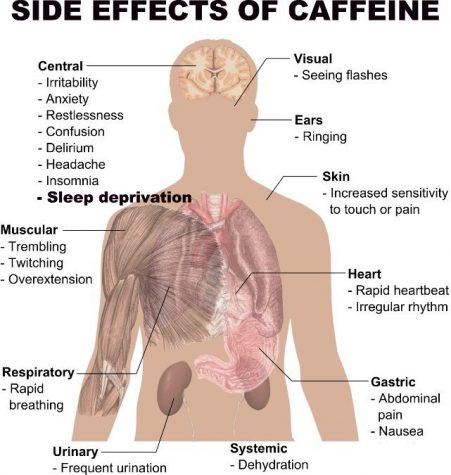 anxiety, and even panic attacks. To be on the safe side, studies have shown that no more than 250 milligrams of caffeine should be consumed.
anxiety, and even panic attacks. To be on the safe side, studies have shown that no more than 250 milligrams of caffeine should be consumed.
“I used to consume three black cups of coffee a day with two shots of espresso, I have since cut down, but yeah three cups every day,” said Mercy College junior, Miriam Oedegaard.
Though caffeine may be the most popular drug in the world, there may also be advantages to consuming caffeine. For example, coffee, many people enjoy the taste of it, but aside from that, it has been found that there’s health benefits to the consumption of it. Studies from the Harvard Medical School have found that coffee may have anti-cancer properties and decrease the risk of diabetes and Parkinson’s disease in men.
Caffeine affects everyone differently; not one person reacts the same. It’s usually based upon size, weight and health. Since caffeine enters the human body system through the stomach, it only takes almost five to ten minutes for the human body to pick up all the different effects.
Though it only takes five to ten minutes for the caffeine to activate, it stays in the body system for at least ten to fifteen hours and takes approximately six hours for half of the caffeine that’s been consumed, to be eliminated.
The quick rise of feeling alertness, restlessness, excitability, and dizziness become more noticeable. Dehydration and the need to urinate kicks in, while a higher body temperature, a faster breaking and heart rate also occurs.
Olivia Calabro, a sophomore studying Occupational Therapy Assistant says on average she loses sleep between two to three nights a week.
Calabro never has more than one cup a day, and when she does have it it’s rarely late at night. it’s usually afternoon or morning. The risks of sleep deprivation Calabro knows, but the risks of caffeine, she’s unsure of.
When an individual becomes very dependent on caffeine and then all of a sudden the levels drop, this can lead to a crash. Depression and anxiety can occur at this time. Low blood-sugar levels can cause feelings of depression, and when caffeine isn’t in the body’s system, people often experience a caffeine crash.
Aside from these, the consumption of caffeine more than 500 to 600 milligrams a day, causes insomnia. Many students suffer from insomnia, but because of this sleep deprivation, it causes more consumption of caffeine, creating a sleep cycle.
Because it takes six hours for caffeine to properly exit the body, if caffeine is ingested later in the day, it can interrupt sleep. This starts off with a mild disruption of sleep, when the individual is waking up during the middle of the night with difficulty going back to sleep.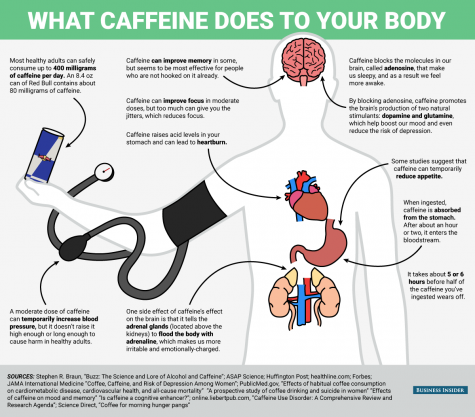
If caffeine has a persistent effect on your sleep cycle, insomnia is what happens. Individuals who consume more than 300 mg of caffeine per day are usually more likely to fall into this state.
Not only are their side effects when consuming caffeine, but there’s side effects of caffeine withdrawals. The most common effects are severe headaches, fatigue, sleepiness and an inability to concentrate on activities. Other illnesses linked to caffeine withdrawals include nausea, vomiting and muscle pain.
The effects of a caffeine withdrawal lasts for two to nine days. The peak of the withdrawal normally occurs between 20 to 48 hours following the last consumption of caffeine. Normally, when this happens, research proves that many people go back to consuming caffeine. Ways to go around this is to slowly and gradually substitute caffeinated beverages for decaffeinated products, instead of quitting right away.
“I need my one cup of coffee a day, if I don’t have it, I get caffeine headaches,” says Jessica Santana.
There are many soft drinks that have caffeine, while there are others that are caffeine-free. Sodas that are most clear, such as lemon-lime soft drinks; not all clear soft drinks are caffeine-free, though. Majority of all the ginger ales that are out there, are all caffeine-free, but it’s still smart to check the ingredient labels before consuming.
A study that was done at the University of Paris in France discovered that women who drank three cups of caffeine per day had less decline over time on memory tests compared to women who drank one cup or less of caffeine.
Caffeine has been called the most popular drug in the world. It is found naturally in over 60 plants including the coffee bean, tea leaf, kola nut and cacao pod. All over the world people consume caffeine on a daily basis in coffee, tea, cocoa, chocolate, some soft drinks, and some drugs.
Brandi Blanchett, a legal studies senior admitted she drinks caffeine a lot during the week.
“I usually drink it to wake myself up or to give myself a pick up on some days,” Blanchette said.
Although she drinks it a lot during the week, she also knows the risks of drinking caffeine.
“You shouldn’t drink caffeine after a certain time if you are trying to go to bed at a decent hour and should not consume too much, or it can do damage to your heart,” Blanchett said.
Because caffeine is a stimulant, most people use it after waking up in the morning or to remain alert during the day. While it is important to note that caffeine cannot replace sleep, it can temporarily make us feel more alert by blocking sleep-inducing chemicals in the brain and increasing adrenaline production.
There is no nutritional need for caffeine in the diet. Moderate caffeine intake, however, is not associated with any recognized health risk. Three 8 oz. cups of coffee (250 milligrams of caffeine) per day is considered a moderate amount of caffeine. Six or more 8 oz. cups of coffee per day is considered excessive intake of caffeine.
Caffeine enters the bloodstream through the stomach and small intestine and can have a stimulating effect as soon as 15 minutes after it is consumed. Once in the body, caffeine will persist for several hours: it takes about 6 hours for one half of the caffeine to be eliminated.
About 8% of students don’t even get 5 hours per sleep on average during their usual weeknight while classes are in session.
Pulling an all- nighter is considered to be a sport by some college students. It takes effort into staying up all hours of the night with a little help from one’s best friend caffeine. College students tend to consume so much caffeine whether it be coffee, or caffeinated drinks or different kinds of snacks. They are all factors to help keep one awake at night.
There are many health risks that also come with sleep deprivation that college students should look out for. For starters, one can get diabetes, have a stroke, or even a heart attack. Sleep deprivation can cause one’s skin to age quicker than it already is. Applying pounds of makeup doesn’t help either. Makeup combined with sleep deprivation makes one look older than you truly are faster than one may want.
Cramming the night before or the morning of an important exam isn’t the best either. That lack of sleep can cause one to forget everything one just studied. One may remember it while looking at the page, but once the exam is on the table, the mind goes blank. The reason for that is because one’s mind is so tired from all the cramming, that it just needs a break.
Another health risk lack of sleep can cause is poor choices in food and drink decisions. On top of being up for more hours than one can count, one chooses foods and drinks that help keep people up to do more work. Such as caffeine, and sugar based foods. Picking these foods, causes one to gain weight, hence the freshman 15.
A developing concern among researchers has been the correlation between increasingly poor sleep quality and the dependency on over-the-counter drugs and other sleep aids. Those college students with unhealthy sleep patterns are twice as likely to use alcohol and other drugs as sleep inducers.
All in all, sleep is a very important factor to have a healthy living. Caffeine is also important, and very tasty, but one has to watch the amount of caffeine they drink. Yes, activities and jobs and schoolwork are important, but so is sleep.
One can manage to figure out how to juggle all the things one must get done within their day. Not getting enough sleep causes damage to the body and the brain.
One day everyone will learn how to get the sufficient amount of sleep as well as get everything done all within 24 hours.
In the wise words of Napoleon Hill, “Strength and growth come only through continuous effort and struggle.”

Weronika is majoring in Media Studies/Radio and Television Production at Mercy College.
Her hobbies are obsessing over television shows, mainly Supernatural...

Kayla Simas is a Journalism major at Mercy College. She's from the forgotten borough of New York - Staten Island. She's an avid coffee drinker and enjoys...



